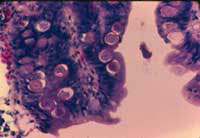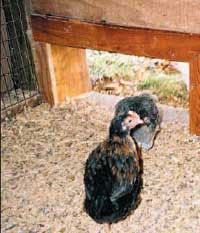
Transmission in the Environment
 |
| Coccidia multiply in intestinal cells. |
Chickens get coccidiosis by eating oocysts that have been shed in the droppings of infected chickens. Infected chickens shed oocysts for several days or weeks. Oocysts sporulate within two days under the proper conditions and become infective. Chickens pick them up by pecking on the ground or in litter used for bedding in the house. Oocysts can also be spread by insects, dust, wild birds, and humans (from shoes and equipment).
Oocysts can survive many weeks in the soil outdoors – as long as 600 days. (Farr and Wehr, 1949) The optimum temperature for sporulation is around 72°F. The rate of sporulation is slower if temperatures are much cooler or hotter. Oocysts are killed either by freezing or very high temperatures.
 |
| Chicks can pick up oocysts both indoors and on pasture. |
Sporulation also requires oxygen and moisture (at least 20 percent moisture in the litter for optimal sporulation). If the litter feels damp to the back of your hand, it is damp enough for sporulation. Once sporulated, the oocyst remains infective for months if protected from very hot, dry, or freezing conditions.
In very large poultry houses, oocysts do not last long in the litter because of the action of ammonia released by decomposition of litter and manure and by the action of molds and bacteria. However, there are usually so many oocysts that birds continue to pick them up and get sick.
Copyright © NCAT 1997-2007. All Rights Reserved.


 © 2000 - 2021. Global Ag MediaNinguna parte de este sitio puede ser reproducida sin previa autorización.
© 2000 - 2021. Global Ag MediaNinguna parte de este sitio puede ser reproducida sin previa autorización.